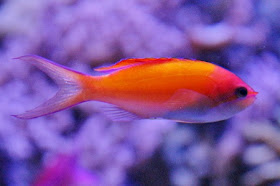I visited Port of Nagoya Public Aquarium, Aichi prefecture to see biological impacts of Fukushima No.1 nuclear power plant accident. Though I have visited various places in Japan to see the health consequences of the accident, I have never found any effect against creatures in Japan.
The aquarium has large sea mammals like dolphins and white whales (Beluga) that adapted to sea life in a long course of evolution are introduced in the North Annex. Various kinds of water creatures that live in 5 sea zones from Japan to the Atlantic are featured in South Annex. Currently there are 4 Killer Whales (Orca) including a baby which was born at this aquarium in November 2012.
Now they are open to the public at the main pool, and visitors can see them trained by the staff.
Generally speaking, marine animal's growths are so fast than human beings that they are more sensitive to radioactive materials of the environment than us. So I visited Port of Nagoya Public Aquarium to see effects of the accident against creatures which are grown up by Japanese food and water. Fortunately, I could see them grown up safely and I couldn't find any impact of the Fukushima nuclear power plant accident. It seems that there is no problem for childbirth and child-rearing in Nagoya.
Posted by Yoshitaka Kiriake from Japan on June 14, 2014.
愛知県の名古屋港水族館は世界最大級の水族館です。ここの巨大なプールで繰り広げられる豪快なイルカショーは驚きと興奮の連続で何度でも見たくなります。美しいサンゴのコレクションはとても豊富で、オオシャコガイなど貴重な生物も見ることが出来ます。2014年5月撮影。
See the Dolphin show!
名古屋港水族館
Port of Nagoya Public Aquarium
Access
Google map
Beluga
ベルーガ
Bubble coral
ミズタマサンゴ
Giant clam
オオシャコガイ
Bronze Whaler
クロヘリメジロ
Pacific bluefin tuna
クロマグロ
Stone flounder
イシガレイ
Stripey
カゴカキダイ
Japanese pinecone fish
マツカサウオ
Sunrise perch
アカイサキ
Beard grunt
ヒゲダイ
Longtooth grouper
クエ
Yellow goosefish
キアンコウ
Square-spot fairy basslet (male)
スミレナガハナダイ (オス)
Square-spot fairy basslet (female)
スミレナガハナダイ (メス)
Adelie penguin
アデリーペンギン
This Loggerhead turtle was born on August 11, 2013
アカウミガメ
This Pig-nosed turtle was born on April 2013.
ブタバナガメ
Dolphins show us dynamic performance.
How big Killer whale is!
豪快なシャチのジャンプ
Killer whale
Japanese foods are good and safe.
Because of stricter food safety law by Japanese government, we have no worry about foods.
Ekiben : box lunch sold at a station
Kakinoha zushi : Sushi which are wrapped with persimmon leaves.
Strawberries and cream
Cakes
Killer whale shaped steamed bun
Sushi
About 3 years have passed since Fukushima Daiichi nuclear power plant accident. I have visited various places of Japan to see the health consequence of the accident.
Fortunately I have never found any impacts by the accident among Japanese creatures. As far as I know, nobody has health problem which is caused by the accident in Japan.
Our Prime Minister Abe assures that "The situation is under control. The influence of the contaminated water is completely blocked within Fukushima. There are no health-related problems until now and there will never be health problems." He also said that "Tokyo is 250 kilometers away from Fukushima, and the kind of danger that you imagine does not exist in Tokyo. Tokyo is a very safe city."
As PM Abe said, Nagoya is very far away from Fukushima, people in Nagoya have no concern about the nuclear power plant accident. People in Nagoya, Aichi prefecture have already forgotten the accident, because they think radioactive materials cannot reach there.
We know there is no problem for child birth and child rearing in Nagoya too. So people in Nagoya, Aichi prefecture are living without any concern about the accident. I continue to visit various places in Japan to see the effects of the accident, because I can meet various creatures which are more sensitive to radioactive materials from the environment. It is important to see their health for our safety.
公衆衛生ネットワーク
Public Health Network in Japan


































0 件のコメント:
コメントを投稿